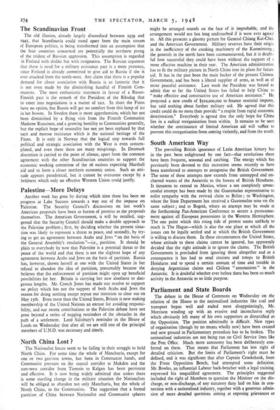Palestine—More Delays
Another week has gone by during .which time there has been no progress at Lake Success towards a way out of the impasse on Palestine. The Security Council's discussions on last week's American proposals have been as barren of promise as the proposals themselves. The American Government, it will be recalled, sug- gested that the Security Council should make a double approach to the Palestine problem ; first, by deciding whether the present situa- tion was likely to represent a threat to peace, and secondly, by try- ing to get an agreement between Arabs and Jews " on the basis of the General Assembly's resolution "—i.e., partition. It should be plain to everybody by now that Palestine is a potential threat to the peace of the world and that there is not the slightest hope of any agreement between Arabs and Jews on the basis of partition. Russia has, however, shown herself at one with the United States in her refusal to abandon the idea of partition, presumably because she believes that the enforcement of partition might open up -beneficial possibilities for her. Britain is carrying her new aloofness to dan- gerous lengths. Mr. Creech Jones has made our resolve to support no policy which has not the support of both Arabs and Jews the reason for doing nothing except repeat our intention to clear out on May 15th. Even more than the United States, Britain is now making membership of the United Nations an excuse for avoiding responsi- bility, and our recent contributions to the Palestine debate have not gone beyond a series of nagging reminders of the obstacles in the path of a settlement. Lord Salisbury's reminder in the House of Lords on Wednesday that after all we are still one of the principal members of U.N.O. was necessary and timely.






























 Previous page
Previous page